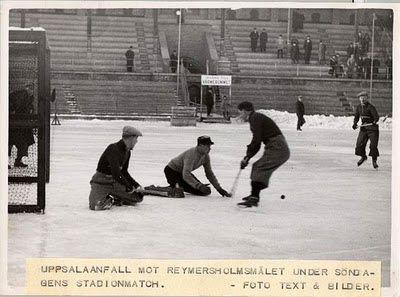Hockey Behind the Iron Curtain

This weekend I picked up 1965 Hockey Illustrated Winter Annual magazine. As you can imagine, it is chock full of great articles but one I found very interesting and fits my Olympic only theme. In an article title “Hockey Intrigue Behind the Iron Curtain” the story is told of both Russia’s and Czechoslovakia’s rise to hockey powers.
Russia had just taken the 1964 Olympic Gold medal in Innsbruck, Austria winning their second Olympic hockey gold. Canada finished with a 5 and 2 record and in a three-way tie for second with the Czechs and Sweden. In a controversial decision, the Canadians were placed in fourth due to a lesser goals differential.
The Czechs had entered a team since 1920 and had won an Olympic silver in 1948. The Russians were still devoted to the ice game of bandy at this time. At these ’48 Games in St.Moritz, Switzerland the Russians sent observers with cameras to record the hockey action.
As told by former Czech hockey great, Josef Malecek in the article, “Later that same year the LTC team of Prague went to Moscow for some exhibition games. The Czech team went there with the best equipment purchased from the CCM company of Toronto. When they arrived in Moscow they watched the Russian team practice and laughed because that club wore almost all soccer equipment.” According to Malecek, the Czechs left their gloves, pads, protectors and sticks in a locker room overnight. “The next day, the Russians showed up on the ice with the same type of equipment the Czechs had. They had taken it from the locker room and had similar equipment made up in less than 24 hours. The films and this equipment…that’s the way Canadian hockey began in Russia.”
Of course by 1954, Russia competed in it’s first World Championship and won Gold. In 1956 in Cortina d’Ampezzo, Italy they captured their first Olympic gold.
Josef Malecek continues with a few more tales from behind the Iron curtain (Russia had occupied Czechoslovakia in 1948). He describes what can happen to an athlete who stands up to the communist party line in an incident involving Czech National team goalie, Boza Modry. “Modry was the best goalie in Europe, the Czechs had just won the World title and this was excellent propaganda for the communists. Modry did not want to be part of this. He told them he was retiring from the game. They insisted that he continue, but he refused. A little while later, he was arrested by the secret police and sent to a uranium mine.”
Malecek continues, “Another time, nine players from the national team were in a restaurant and they talked against the Communists. They were overheard by a member of the secret police and arrested. They each spent about six years in prison. This was the nucleus of the national team, so for four years after that Czechoslovakia did not send a team to any international tournaments.” Upon looking up the records, it is true that the Czechs did not participate in either the 1950 or 1951 World Championships.
Joseh Malecek is considered hockey’s first 1000 goal scorer, as illustrated by Patrick Houda in the 2006 Society for International Hockey Research journal. According to Houda, Malecek tallied 1,151 goals in 531 chronicled games, including 151 career hat-tricks. Nowadays we may forget the harsh beginnings of these two hockey superpowers under the control of Communism. One thing for certain the rest of the hockey world no longer laughs at the Russians.



Comments